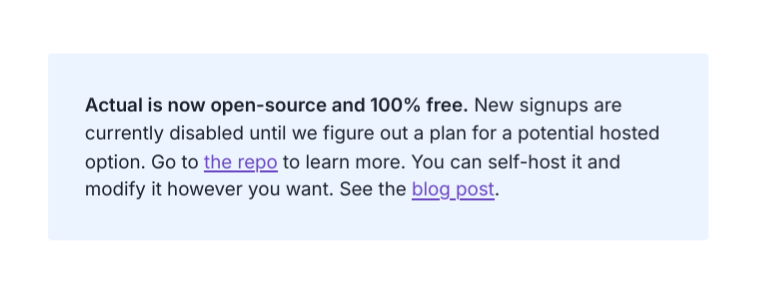

Nothing in the article or in the Bitwarden repo suggests that it’s moving away from open source


Nothing in the article or in the Bitwarden repo suggests that it’s moving away from open source


Here it is:


They recommend SimpleFIN instead of Plaid: https://old.reddit.com/r/selfhosted/comments/1cmfk8x/actualbudget_has_anyone_written_a_plaid_importer/


You jumped to a conclusion on pricing and made a mistake, it’s ok, no big deal.


Lol you weirdo, I even said I did that:


Try clicking either of those links.
Regardless, this is a thread about self-hosted open-source budgeting, which is why I linked to Actual Budget. I have updated the first post to be the Github link instead to prevent confusion.


all I saw was pricing […] can you really blame me?
I mean I really can. They don’t have any paid option so you definitely didn’t see any pricing. They only have a big open source message:



You’re replying to my comment about Actual Budget, the very open source budgeting solution?


Net worth and investment tracking goes in my spreadsheets, budgeting in Actual Budget.


Why not Actual Budget, which is also self-hosted, open-source bucket budgeting based off YNAB, however it appears to be a lot more mature.
They also transparently run the project on Open Collective which I like: https://opencollective.com/actual
Any cloud is a secure backup on Linux if you use rclone crypt :)
It works with Google Drive, Dropbox, One Drive, and countless others to create an encrypted cloud storage, where the cloud provider can never view your file contents.


Oh I agree with you. I am a daily crypto user and I have no use for this wallet. I was just offering some things it adds which might be useful.
Lightning is a big missed opportunity. Phoenix is the only wallet I know that has solved this in a user-friendly way.
(I did also mention that it only works between Proton accounts.)


The wallet doesn’t add anything directly useful.
It adds a couple of things which can be useful:
You have a single receive email, but it’s associated with a full HD wallet, so every receive will generate a brand new unused address for the sender. As the email is static, you could for example post it for donations and not have to worry about people being able to track anything you’ve received.
They have support which you can contact, which while almost certainly isn’t important for you, for your aunty it might be useful.


Or Linux Drive…


who is maintaining custody of the Bitcoin
It’s self-custody.


You neglected to quote the most relevant part of the article which answers your own question regarding Monero:
Proton Wallet is in a strange position. I’ve spoken to a few sources who suggest that privacy features like CoinJoin, which can mix Bitcoin in order to better anonymize transactions, were intended to be included at launch. The crackdown on the ill-fated Samouri Wallet project by U.S. authorities last April certainly put a damper on privacy in the Bitcoin space, and likely made Proton wary of introducing such features to the public.
Proton suggests this themselves, stating on their website:
“Coinjoin is considered the best solution for improving blockchain privacy. It works by mixing your BTC with other users’ BTC in a collaborative self-custodial transaction where you get back the same amount of BTC that you put in but on a different address that cannot be easily linked to your previous address. However, in 2024, in what many consider to be a regulatory overreach and attack on privacy, some of these Coinjoin services have been declared illegal in the US and EU. The future of financial privacy may therefore be decided by ongoing litigation in the next decade and privacy advocates should support these efforts.”
This situation likely soured Proton on other privacy-friendly cryptocurrencies like Monero as well. I get it, financial privacy is an extremely challenging task for any company to take on. We can’t expect Proton to take on the risk of offering a completely anonymous payment service in the current legal climate, but it begs the question: why enter the financial space at all?
While not particularly revolutionary, the fact that they provide a unique HD wallet address every time you receive funds through your same email address does provide additional privacy as no one can see your previous transactions. Even when those are rolled up together later it does make it harder to associate an exact total balance with you. If you used your wallet for smaller spending rather than making a single large send from it, that makes it harder still.
Sure, I would have liked them to add Monero too, but it gets thorny when you’re a regulated company dealing with that.


I would enjoy it if she brought out a large 2 minute countdown timer to start every time he starts talking.


If they’re running their own LLM hardware, and their Lemmy spam posts are generating enough revenue to cover that, then I take it back, because that is impressive.
I guess we’re fucked.


I’d actually prefer that. Micro transactions. Would certainly limit shitposts
They’re not really comparable since Bitwarden has the source available for auditing and Proton Pass (server) does not.